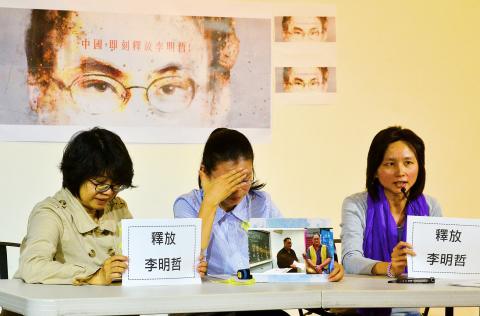The wife of a human rights advocate detained in China plans to depart for Beijing on Monday to seek the release of her husband, who has been held in an unknown location by Chinese authorities for 17 days.
The Chinese government detained rights advocate Lee Ming-che (李明哲) on March 19 over his alleged involvement in activities that “endanger national security.”
Lee’s wife, Lee Ching-yu (李凈瑜), said that she would fly to Beijing to seek her husband’s release herself, without the help of a lawyer.

Photo: Wang Yi-sung, Taipei Times
Lee Ching-yu said she decided to visit Beijing after the meeting between US President Donald Trump and Chinese President Xi Jinping (習近平), which begins tomorrow, to avoid “unnecessary associations and confusion.”
“As much as I want to depart for Beijing immediately, the Trump-Xi meeting could have an effect on regional peace and I do not want my action to stand in the way of a global event,” she said. “I made the decision as a Republic of China citizen. I have to stand with my nation.”
She is to visit China’s Taiwan Affairs Office, the Chinese Supreme People’s Procuratorate and other agencies to understand where and on what charges Lee Ming-che is being held, as well as to deliver his blood pressure medication.
She plans to take the trip independently since the government has offered little assistance since she first announced it on Friday last week.
“I do not believe my nation would abandon its citizens no matter which party is in power. I understand the pressure put on the government because of Taiwan’s special conditions, but neither the Mainland Affairs Council [MAC] nor the Straits Exchange Foundation [SEF] has given me any meaningful information or concrete rescue plans. They could not even help me deliver [Lee’s] medicine,” she said.
The MAC and the SEF should at least have a plan to support her, she said, adding that she would formally visit the two agencies today to seek assistance.
Lee Ching-yu has received conflicting information about her husband’s whereabouts and the possible charges against him, including involvement in the East Turkestan independence movement, acts of terrorism and seeking prostitutes — with penalties ranging from a fine to 15 years in prison — but she could not verify the information without official word from Beijing.
The Chinese government has snubbed Taiwan’s requests for information, she said.
“I have suffered as the families of political victims suffered during the White Terror era. I have been told to succumb to Beijing and not to offend China or pay for the help of influential people,” she said.
She called on China to ensure her right as a family member of a detainee to visit her husband.
Taiwan Human Rights Association secretary-general Chiu E-ling (邱伊翎) called on the government to actively engage in the matter, ensure Lee Ching-yu’s personal safety and facilitate her meetings with Chinese officials.

A magnitude 7.0 earthquake struck off Yilan at 11:05pm yesterday, the Central Weather Administration (CWA) said. The epicenter was located at sea, about 32.3km east of Yilan County Hall, at a depth of 72.8km, CWA data showed There were no immediate reports of damage. The intensity of the quake, which gauges the actual effect of a seismic event, measured 4 in Yilan County area on Taiwan’s seven-tier intensity scale, the data showed. It measured 4 in other parts of eastern, northern and central Taiwan as well as Tainan, and 3 in Kaohsiung and Pingtung County, and 2 in Lienchiang and Penghu counties and 1

FOREIGN INTERFERENCE: Beijing would likely intensify public opinion warfare in next year’s local elections to prevent Lai from getting re-elected, the ‘Yomiuri Shimbun’ said Internal documents from a Chinese artificial intelligence (AI) company indicated that China has been using the technology to intervene in foreign elections, including propaganda targeting Taiwan’s local elections next year and presidential elections in 2028, a Japanese newspaper reported yesterday. The Institute of National Security of Vanderbilt University obtained nearly 400 pages of documents from GoLaxy, a company with ties to the Chinese government, and found evidence that it had apparently deployed sophisticated, AI-driven propaganda campaigns in Hong Kong and Taiwan to shape public opinion, the Yomiuri Shimbun reported. GoLaxy provides insights, situation analysis and public opinion-shaping technology by conducting network surveillance

‘POLITICAL GAME’: DPP lawmakers said the motion would not meet the legislative threshold needed, and accused the KMT and the TPP of trivializing the Constitution The Legislative Yuan yesterday approved a motion to initiate impeachment proceedings against President William Lai (賴清德), saying he had undermined Taiwan’s constitutional order and democracy. The motion was approved 61-50 by lawmakers from the main opposition Chinese Nationalist Party (KMT) and the smaller Taiwan People’s Party (TPP), who together hold a legislative majority. Under the motion, a roll call vote for impeachment would be held on May 19 next year, after various hearings are held and Lai is given the chance to defend himself. The move came after Lai on Monday last week did not promulgate an amendment passed by the legislature that

Taiwan is gearing up to celebrate the New Year at events across the country, headlined by the annual countdown and Taipei 101 fireworks display at midnight. Many of the events are to be livesteamed online. See below for lineups and links: Taipei Taipei’s New Year’s Party 2026 is to begin at 7pm and run until 1am, with the theme “Sailing to the Future.” South Korean girl group KARA is headlining the concert at Taipei City Hall Plaza, with additional performances by Amber An (安心亞), Nick Chou (周湯豪), hip-hop trio Nine One One (玖壹壹), Bii (畢書盡), girl group Genblue (幻藍小熊) and more. The festivities are to